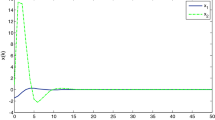Abstract
In this paper, H ∞ control synthesis of linear time invariant singularly perturbed systems (SPS) based on a generalized KYP lemma approach is investigated. By employing a generalized KYP lemma on the low- and high-frequency domains of SPS, respectively, a slow (low-frequency) controller and a fast (high-frequency) controller are designed to stabilize the slow and fast subsystems, and also to meet the individual H ∞ performance specifications. A composite controller for the full-order SPS is constructed via the above two above well-defined lower-order problems. Moreover, the effectiveness of the proposed method is verified as compared with the traditional H ∞ design method by its application to a tracking problem of SPS and an H ∞ model matching problem for SPS.
Similar content being viewed by others
References
C.T. Chen, Linear System Theory and Design (Holt Rinehart & Winston, New York, 1984)
V. Dragan, Asymptotic expansions for game-theoretic Riccati equations and stabilization with disturbance attenuation for singularly perturbed systems. Syst. Control Lett. 20(6), 455–463 (1993)
V. Dragan, P. Shi, E.K. Boukas, Control of singularly perturbed system with Markovian jump parameters: An H ∞ approach. Automatica 35, 1359–1378 (1999)
E. Fridman, Near-optimal H ∞ control of linear singularly perturbed systems. IEEE Trans. Automat. Control 41(2), 236–240 (1996)
E. Fridman, State-feedback H ∞ control of nonlinear singularly perturbed systems. Int. J. Robust Nonlinear Control 6, 25–45 (2001)
C. Gong, B. Su, Robust H ∞ filtering of convex polyhedral uncertain time-delay fuzzy systems. Int. J. Innov. Comput. Inf. Control 4(4), 793–802 (2008)
T. Iwasaki, S. Hara, Robust control synthesis with general frequency domain specifications: static gain feedback case. In: Proc. Amer. Control Conf. (2004)
T. Iwasaki, S. Hara, Generalized KYP lemma: unified frequency domain inequalities with design applications. IEEE Trans. Automat. Control 50, 41–59 (2005)
T. Iwasaki, S. Hara, Feedback control synthesis of multiple frequency domain specifications via generalized KYP lemma. Int. J. Robust Nonlinear Control 17, 415–434 (2007)
T. Iwasaki, S. Hara, A.L. Fradkov, Time domain interpretations of frequency domain inequalities on (semi) finite ranges. Syst. Control Lett. 54, 681–691 (2005)
H.K. Khail, Output feedback control of linear two-time-scale systems. IEEE Trans. Automat. Control 32, 784–792 (1987)
H.K. Khail, F.C. Chen, H ∞ control of two-time-scale systems. Syst. Control Lett. 19, 35–42 (1992)
P.V. Kokotovic, H.K. Khalil, J. O’Reilly, Singular Perturbation Methods in Control: Analysis and Design (Academic Press, New York, 1986)
D.W. Luse, Frequency domain results for systems with multiple time scales. IEEE Trans. Automat. Control 31, 918–924 (1986)
D.W. Luse, J.A. Ball, Frequency-scale decomposition of H ∞ disk problems. SIAM J. Control Optim. 27, 814–835 (1989)
D.W. Luse, H.K. Khail, Frequency domain results for systems with slow and fast dynamics. IEEE Trans. Automat. Control 30, 1171–1179 (1985)
H.M. Oloomi, M.E. Sawan, H ∞ model matching problem for singularly perturbed systems. Automatica 32, 369–377 (1996)
Z. Pan, T. Basar, H ∞ optimal control for singularly perturbed systems Pan I: Perfect state measurements. Automatica 29, 401–423 (1993)
Z. Pan, T. Basar, H ∞ optimal control for singularly perturbed systems Part II: Imperfect state measurements. IEEE Trans. Automat. Control 39, 280–299 (1994)
A. Rantzer, On the Kalman–Yakubovich–Popov lemma. Syst. Control Lett. 28(1), 7–10 (1996)
T.L. Shen, H ∞ Control Theory and Applications (Tsinghua University Press, Beijing, 1996)
P. Shi, V. Dragan, Asymptotic H ∞ control of singularly perturbed system with parametric uncertainties. IEEE Trans. Automat. Control 44, 1738–1742 (1999)
W. Tan, T. Leung, Q. Tu, H ∞ control for singularly perturbed systems. Automatica 34, 255–260 (1998)
Y. Wang, Z. Sun, H ∞ control of networked control system via LMI approach. Int. J. Innov. Comput. Inf. Control 3(2), 343–352 (2007)
Author information
Authors and Affiliations
Corresponding author
Additional information
This work was supported by National Natural Science Foundation of China (No. 60874007) and Research Fund for the Doctoral Program of Higher Education of China (No. 200802550024).
Rights and permissions
About this article
Cite this article
Mei, P., Cai, C. & Zou, Y. A Generalized KYP Lemma-Based Approach for H ∞ Control of Singularly Perturbed Systems. Circuits Syst Signal Process 28, 945–957 (2009). https://doi.org/10.1007/s00034-009-9125-4
Received:
Revised:
Published:
Issue Date:
DOI: https://doi.org/10.1007/s00034-009-9125-4




